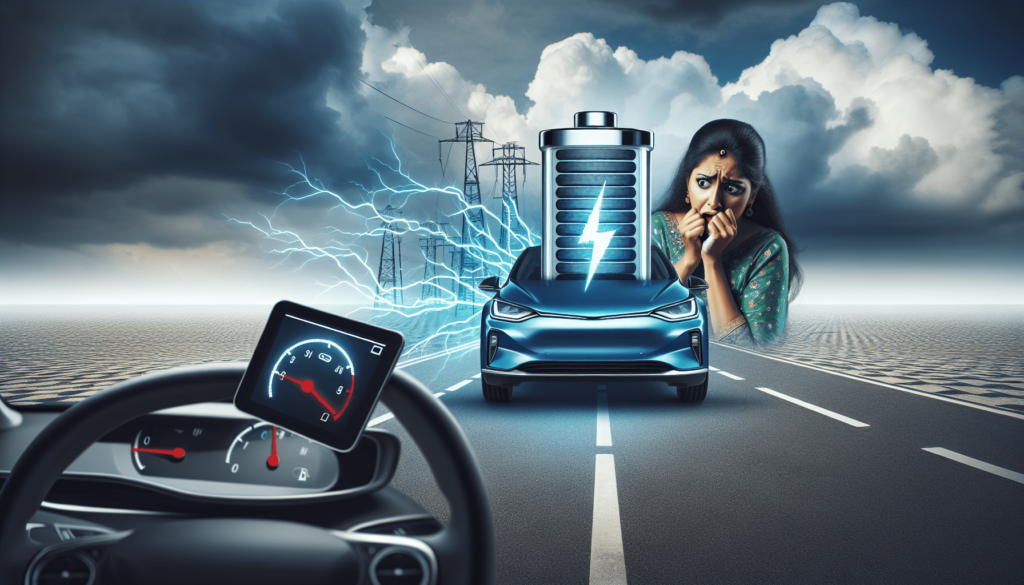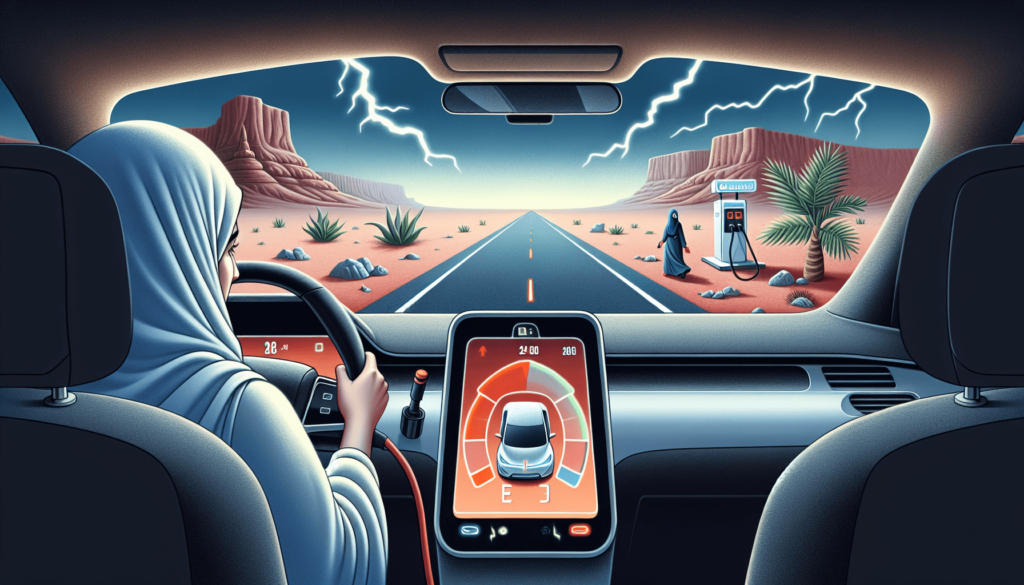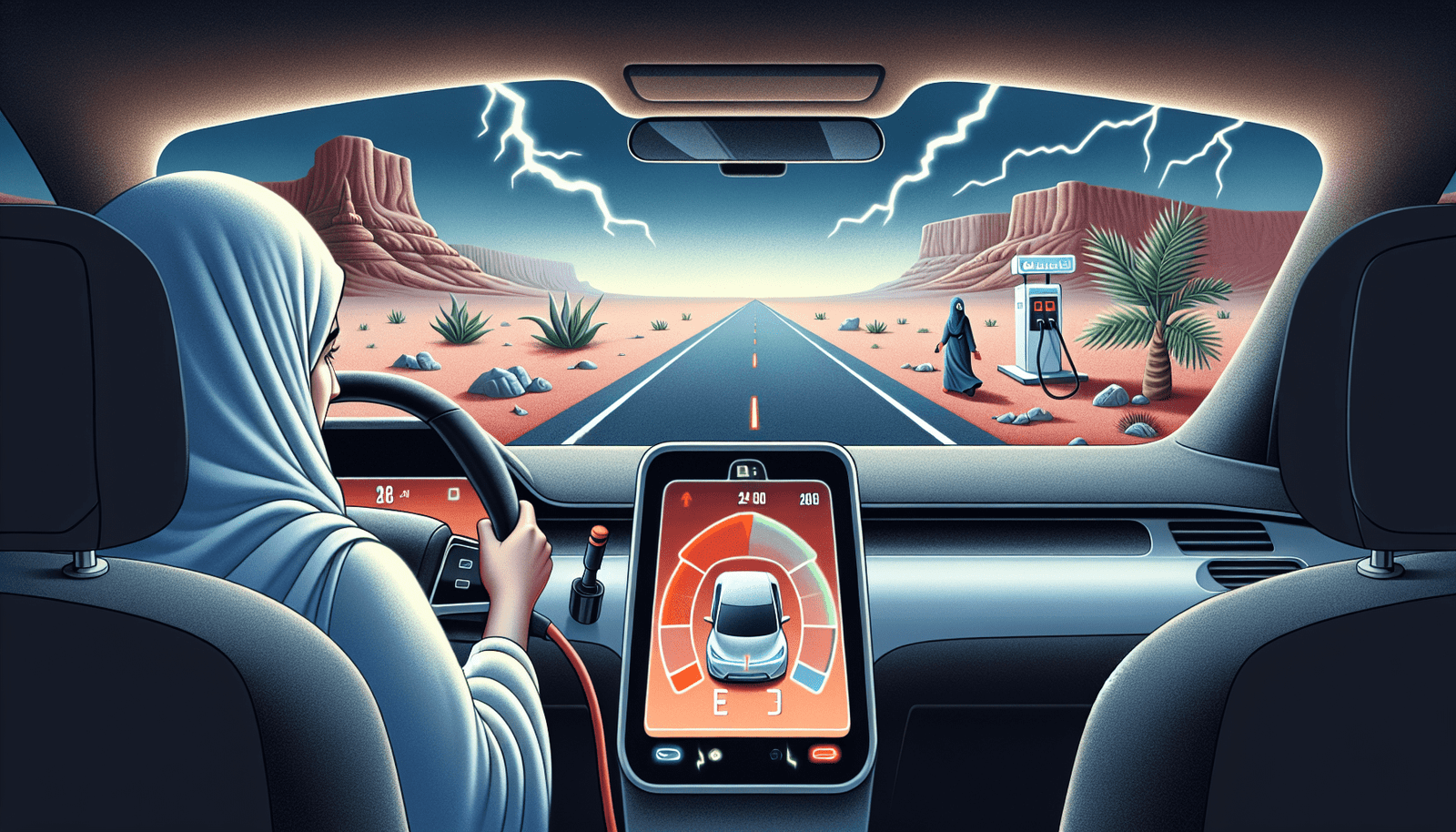Imagine driving your electric vehicle down a quiet country road, feeling the wind in your hair and enjoying the peacefulness of the surroundings. Suddenly, a thought crosses your mind – what if your battery runs out of juice before you reach your destination? This is what is known as range anxiety, the fear of being stranded with no charging station in sight. In this article, we will explore the concept of range anxiety associated with electric vehicles and discuss effective ways to manage it, ensuring a stress-free and enjoyable driving experience for all.

Definition of Range Anxiety
Range anxiety is the term used to describe the fear or concern that an electric vehicle (EV) driver may experience regarding the limited range of their vehicle’s battery. It is the worry that the vehicle will run out of power before reaching the desired destination or a charging point. This can lead to stress and uncertainty, potentially impacting the overall perception and adoption of electric vehicles.
Explanation of Range Anxiety in Electric Vehicles
Range anxiety arises from the fact that electric vehicles have a significantly limited driving range compared to traditional internal combustion engine vehicles. While modern electric vehicles have made significant advancements in battery technology, allowing for longer ranges, the fear of running out of power remains prevalent among potential EV owners. This anxiety stems from the lack of widespread charging infrastructure, the time required for recharging, and the fear of being stranded without a charging option.
Factors Contributing to Range Anxiety
Several factors contribute to range anxiety in electric vehicles. Firstly, the limited range itself is a fundamental cause. Electric vehicles typically have a range of 100 to 300 miles, depending on the model and battery capacity. This range may not be sufficient for longer trips or in areas with limited charging infrastructure. Additionally, factors such as weather conditions, driving habits, and the use of accessories like heating or air conditioning can further impact the vehicle’s range, fueling range anxiety.
Importance of Managing Range Anxiety
Managing range anxiety is crucial for the widespread adoption of electric vehicles and ensuring a positive driving experience for EV owners. By addressing the concerns associated with range anxiety, the perceived limitations of electric vehicles can be overcome, encouraging more individuals to make the switch to clean and sustainable transportation options.
Effect on Adoption of Electric Vehicles
Range anxiety significantly impacts the adoption of electric vehicles. It creates a barrier for individuals who rely heavily on their vehicles for commuting and occasional long trips. The fear of running out of power mid-journey can deter potential buyers from choosing electric vehicles over conventional gasoline-powered cars. Therefore, effective management of range anxiety is essential to alleviate concerns and increase the adoption of electric vehicles.
Impact on Driving Experience
Range anxiety can also have a significant impact on the overall driving experience of electric vehicle owners. The constant worry about the remaining battery range can lead to increased stress and inconvenience. It may require frequent route planning to ensure access to charging stations or making compromises on travel distances. By effectively managing range anxiety, electric vehicle owners can have a more enjoyable and worry-free driving experience, enhancing their satisfaction and positive perception of electric vehicles.

Increasing the Electric Range of Vehicles
To effectively manage range anxiety, several approaches can be taken to increase the electric range of vehicles.
Advancements in Battery Technology
One of the primary ways to improve the electric range of vehicles is through advancements in battery technology. Research and development efforts are focused on improving battery energy density, allowing for greater storage capacity within the same physical size. This leads to longer ranges and reduces range anxiety for EV owners. Additionally, advancements in solid-state batteries and alternative materials can further enhance the efficiency and energy density of electric vehicle batteries, paving the way for even greater range capabilities.
Improvement in Charging Infrastructure
Expanding and improving the charging infrastructure is crucial in managing range anxiety. By increasing the number of charging stations and ensuring their accessibility, EV owners can have peace of mind knowing that they can recharge their vehicles whenever needed. Additionally, advancements in fast charging technology reduce the time required for a full charge, making charging more convenient and reducing range anxiety.
Range-Extender Options
Range-extender options such as onboard generators or fuel cells can provide an additional power source to extend the driving range of electric vehicles. These systems can act as a backup or supplementary power source, reducing range anxiety by providing a safety net for longer journeys or in areas with limited charging infrastructure.
Educating and Empowering Drivers
Educating and empowering drivers can play a crucial role in managing range anxiety.
Providing Accurate Range Estimates
One key element is providing accurate and reliable range estimates to EV drivers. This involves taking into account various factors that can impact the vehicle’s range, such as weather conditions, route topography, and driving habits. By providing realistic range predictions, drivers can better plan their journeys and have a clearer understanding of their vehicle’s capabilities, reducing range anxiety.
Promoting Efficient Driving Techniques
Promoting efficient driving techniques can significantly impact the range of an electric vehicle. Educating drivers on techniques such as regenerative braking, coasting, and avoiding excessive acceleration can help enhance the vehicle’s efficiency and extend its range. By empowering drivers with knowledge and skills to maximize their electric range, range anxiety can be effectively managed.
Enhancing Charging Infrastructure
To manage range anxiety effectively, it is essential to enhance the charging infrastructure.
Expanding Public Charging Stations
Expanding the availability of public charging stations is crucial in reducing range anxiety. By strategically deploying charging stations in convenient locations such as shopping centers, workplaces, and highways, EV owners can easily access charging facilities and alleviate the fear of running out of power. Collaborations between governments, private companies, and utilities are essential in accelerating the expansion of public charging infrastructure.
Installing Fast Charging Stations
Fast charging stations, also known as DC fast chargers, can significantly reduce the charging time for electric vehicles. Installing these high-powered charging stations at key locations along major travel routes and urban areas can help alleviate range anxiety by allowing for quick and convenient charging. The ability to charge a significant portion of the battery in a shorter time frame provides reassurance to EV owners and promotes widespread adoption.
Mobile Charging Solutions
Mobile charging solutions can provide additional flexibility and convenience in managing range anxiety.
Portable Charging Options
Portable charging options such as portable charging cables or portable chargers can be carried by EV owners, allowing them to recharge their vehicles wherever an electrical outlet is available. While portable charging may not provide the same speed as dedicated charging stations, it can serve as a backup option in case of emergencies or as a temporary solution in remote areas with limited charging infrastructure.
Battery Swapping Services
Battery swapping services offer an alternative solution to range anxiety by allowing EV owners to exchange their depleted battery for a fully charged one at dedicated battery swapping stations. This eliminates the need for lengthy charging times and provides a quick solution for range replenishment. However, widespread adoption of battery swapping services would require standardized battery designs and coordination among vehicle manufacturers and service providers.
Range Anxiety Reduction in EV Design
Electric vehicle design can play a crucial role in reducing range anxiety.
Incorporating Larger Battery Capacities
One approach is to incorporate larger battery capacities in electric vehicles. By equipping EVs with more storage capacity, the range can be extended, reducing the frequency of recharging and alleviating range anxiety. Additionally, larger battery capacities allow for improved buffering against degradation over time, ensuring consistent range performance throughout the vehicle’s lifespan.
Intelligent Range Prediction Systems
Intelligent range prediction systems utilize advanced algorithms and real-time data to provide accurate range estimates based on various factors such as driving conditions, route optimization, and personal driving habits. These systems can learn and adapt to individual driving patterns, further enhancing the accuracy of range predictions and minimizing range anxiety for EV owners.
Integration of Renewable Energy Sources
Integrating renewable energy sources, such as solar panels or wind turbines, into electric vehicles can contribute to the overall energy efficiency and range extension. Capturing clean energy from the environment can help offset the energy consumed during driving, effectively increasing the vehicle’s range and reducing both range anxiety and carbon emissions.
Battery Management Systems
Optimizing battery performance and monitoring battery health are crucial for managing range anxiety.
Optimizing Battery Performance
Battery management systems (BMS) play a vital role in ensuring the optimal performance of electric vehicle batteries. By monitoring and optimizing charging and discharging processes, BMS can enhance energy efficiency and maximize the usable capacity of the battery. This not only extends the range of the vehicle but also enhances the overall reliability and longevity of the battery, reducing range anxiety for EV owners.
Monitoring Battery Health
Regular monitoring of battery health is essential to prevent unexpected range degradation and ensure the longevity of the battery pack. By providing accurate information on battery capacity and health, EV owners can make informed decisions and take proactive measures to maintain optimal battery performance. This helps in managing range anxiety by providing peace of mind and minimizing the risk of unexpected battery issues.
Psychological Impact of Range Anxiety
In addition to the technical aspects, addressing the psychological impact of range anxiety is crucial in managing this concern.
Addressing Driver Concerns and Fears
Understanding and addressing the concerns and fears associated with range anxiety is essential for managing the psychological impact on EV owners. By providing clear information, education, and support, manufacturers and service providers can help alleviate anxiety and build trust among potential and existing EV owners. This may include offering 24/7 customer assistance, providing detailed charging station information, and promoting a sense of community among EV owners.
Offering Reassurance and Support
Offering reassurance and support to EV owners can go a long way in managing range anxiety. Manufacturers and service providers can provide resources and tools to help drivers plan their journeys effectively, including route planners that consider charging station locations and charging time estimates. Moreover, ongoing customer engagement and feedback loops can ensure continuous improvement in addressing range anxiety concerns and optimizing the overall EV ownership experience.
Future Outlook and Research
Ongoing studies and research are actively being conducted to further understand and manage range anxiety.
Ongoing Studies on Range Anxiety
Researchers and industry experts are continuously studying range anxiety to identify its underlying causes and develop effective strategies to manage it. These studies involve factors such as driver behavior, psychological responses, and the impact of charging infrastructure on range anxiety. Findings from these studies will help inform and guide future developments in electric vehicle technology and range anxiety management.
Potential Solutions and Innovations
Innovative solutions and continuous advancements in battery technology, charging infrastructure, and vehicle design offer promising potential in the management of range anxiety. As technologies evolve and become more efficient, electric vehicles will continue to address range limitations and alleviate range anxiety for EV owners. Additionally, collaborations between industry stakeholders, policymakers, and academia will play a vital role in fostering innovation and accelerating the adoption of sustainable transportation options.

